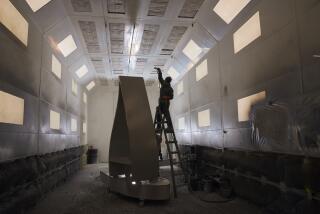CALIFORNIA COMMENTARY : Rethink and Retool to Revitalize : Taking the lead in the electric-car industry would open a new job market and and get the jump on the Japanese.
The announcement by General Motors that it plans to close its Van Nuys plant, coming after serious cutbacks in the local defense and aerospace industries, underscores the need to find new directions for Southern California’s economy. One possibility is the emerging electric-car industry.
The electric car represents a technology that is close to being commercially feasible. It is a highly desirable substitute for the gasoline-powered car because it would greatly reduce pollution. For Southern Californians the big question is: Can we promote this technology so as to improve our environment and at the same time provide desperately needed new jobs?
The global race to achieve a head start in this emerging industry is under way. Japan, Germany, Switzerland, France and the United States, among others, are all significant contenders. The Midwest and Southern California are both potentially important locations for the industry. Which of these countries and regions will manage to take the lead in developing the industry and in establishing a large-scale manufacturing base? Under the right economic and political conditions, Southern California could be in the forefront of the race.
A recent report produced by the Lewis Center for Regional Policy Studies at UCLA investigates the feasibility of creating an electric-car industry in Los Angeles. The study concludes that in view of the existing high-technology and metal-bending industrial capacity in the region and the diversity of skills available, Southern California could be an ideal location.
The report suggests that the industry is likely to start out on a relatively small scale, building cars in the medium-price range aimed at adventurous consumers. It could gradually evolve into a large-scale industry selling cars to mass markets. Already, a Swedish venture, Clean Air Transport, Inc., has entered an agreement with the Los Angeles Department of Water and Power to produce 10,000 electric vehicles. This agreement rose out of the electric vehicle “Initiative” competition, sponsored by the city of Los Angeles. Clean Air Transport is planning to open a manufacturing facility in Southern California within the next couple of years. Amerigon Inc. in Monrovia is another venture that is now beginning prototype work on an electric passenger car.
Clean Air Transport and Amerigon are a good start, but it may not be enough to push Southern California to the lead in the global race to produce electric vehicles. After all, GM has already begun developmental work on its Impact car in East Lansing, Mich., and Toyota and Volkswagen appear to be ready to make a major move.
To ensure that Southern California acquires a significant slice of the pie, a major commitment of public support is essential. The role of municipal and state government agencies, local business associations, labor organizations and lobbying groups is crucial. Financial and institutional resources are needed to support the networks of small- and medium-sized manufacturers and their subcontractors that will most probably make up the industry in its early stages. The main needs are in the development and transfer of technological information, the creation of appropriate labor skills, the provision of necessary infrastructures, venture-capital funding and the nurturing of the kinds of cooperative manufacturing networks that have proved to be so successful in Japan and Western Europe.
A groundswell of public support for the electric-car industry is emerging. The “Initiative” competition referred to above is one example of this. Various groups in city and county government are beginning to work actively on the issue. New economic initiatives are being contemplated by the state, and the electric-car industry is highly visible in these deliberations. And Rep. Howard Berman (D-Panorama City) is working on federal legislation that would lead to the formation of private-public electric-car development consortiums.
From some points of view, the economic outlook for Southern California is bleak. The picture is not totally hopeless, however, and new initiatives like the prospective electric-car industry could take the region forward into a new period of rising prosperity. The electric car has the added advantage that it is dependent on civilian markets and not tied to the vagaries of federal defense spending.
But to be successful, Southern California must combine its proven technological and entrepreneurial talents with the kinds of public and government support for the new industrial developments suggested above. Such a formula could well result in the region becoming a major center of production for electric cars. If this should come to pass the benefits are likely to be enormous: more jobs, more spinoff industries, vastly reduced pollution, diminished dependence on petroleum and perhaps even the beginnings of a real counterattack on the Japanese auto industry.
More to Read
Inside the business of entertainment
The Wide Shot brings you news, analysis and insights on everything from streaming wars to production — and what it all means for the future.
You may occasionally receive promotional content from the Los Angeles Times.










